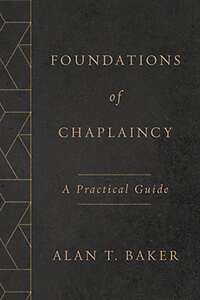Alan T. Baker identifies eight questions that help shift pastoral counseling encounters from reflection toward action. While written for use by chaplains, these questions can be used and adapted by pastors to help gain clarity and identify expectations while simultaneously building trust and confidence in pastoral counseling.
1. Why are you telling me this?
Why is it important for you to tell me this information?
2. Why are you telling this to me?
Why did you pick me to talk to? Are you telling me this because I’m your chaplain? Are you telling everyone this?
3. Why are you telling this to me now?
Why did you pick this time to talk about this? Is there an emergent crisis?
4. Now that you’ve talked with me about this, what do you need to do?
Empower counselees by placing responsibility back on them. Some people come to you because you are an authority figure and they want you to tell them what to do. If you recommend the wrong course of action, then you will be blamed. As a pastoral counselor, you need to draw a distinction between being responsible to this person and being responsible for the person. This places physical responsibility and psychological action back upon the counselee and releases you to truly listen and be available.
Many people are hardwired to seek your counseling because of who you are. Your empathy and care draw them to you. However, you are not expected to carry their burdens. You provide greater benefit to them by walking alongside them. You will learn to balance counseling with other demands placed upon your ministry.
5. Now that you’ve talked to me about this, what do you expect me to do for you?
This question reestablishes your center of gravity and investigates any projected expectations upon you by the counselee — and by you as well. When conducting counseling, many chaplains typically overfocus on problem solving. As you listen to the counselee’s concerns, you imagine a matrix of potential solutions, and you become distracted from listening because you’re thinking of your response and possible ways of solving the problem. But you are not called to solve the counselee’s problem. Instead, you are called to listen, be fully present, and be prayerful. You need to release yourself from expectations. Question five actually releases you.
There is risk to the counselor in asking this question. There are many needy people. Opening yourself up by allowing them to project their expectations upon you may be frustrating. But the reward far exceeds any burden. When chaplains ask this question, most people say, “I just want you to listen.” Christians and other people of faith may also add, “I want you to pray for me.” Their expectations are now meeting yours. Their answer actually decreases your anxiety, because it frees you to talk alongside them while they are actively trying to solve their problem.
There will be times when someone has an unrealistic expectation from you. When this occurs, discuss whether the expectation is reasonable and allow the conversation to continue for additional sessions.
6. With all of this going on, how are things with your soul?
Whereas the first five questions are available to any secular counselor, social worker, psychologist, or psychiatrist, only the spiritual caregiver asks this question. If your soul is healthy, then your mind, body, and will are in agreement. (Dallas Willard, Renovation of the Heart, 2012), If your soul is unhealthy, then one or more of these are likely out of alignment. Asking counselees to talk about their souls is an integrative discussion point. People often expect chaplains to ask about their soul, and it may open up a helpful theological discussion. You can shape this question in a variety of ways. With nonreligious counselees, you can substitute “self” for “soul.” If they are atheist or agnostic, then you might ask them, “How are things with your heart?” or “How are you doing as an integrated, whole person?” If they attend Christian chapel services, you could ask, “How are you seeing God in this? How is your connection with Jesus impacted by your situation?”
7. With all of this going on, would you like me to pray with you?
Because people know you are a pastoral care provider, you can invite them into a source of strength beyond the moment. You can reshape the question as a statement: “I can offer prayer for you, if you’d like me to.” The question is invitational and not impositional. Prayer is not mandatory during the appointment. In fact, it can be seen as dismissive. The chaplain could be tired of hearing about the issue, so the chaplain offers a prayer to conclude a long conversation. Chaplains need to conduct a careful self-assessment in order to best appraise if prayer would be a helpful tool or not. Nevertheless, you will likely be the only person in the organization expected to invite others into prayer.
As a pastoral counselor, you serve as an instrument of God’s grace as you listen to people’s deepest concerns and lift them up in prayer. The invitation to pray opens a conversation where you ask people to identify specific prayer concerns that relate to their presenting issue. Many people seem eager for prayer, but not all. Before you offer a prayer, you might say, “I offer prayer from my Christian tradition.” If there is affirmation beyond acknowledging an okay, then you have permission to proceed. If a counselee doesn’t want you to pray in your tradition, you could invite him into a moment of silence before concluding the appointment. Alternatively, some chaplains feel comfortable offering prayer from a variety of faith traditions. They caution not to provide a “one-size-fits-all approach to prayer” and ask the patient, prisoner, or other counselee what concerns warrant prayer.
8. With all of this going on, what are you going to do now?
This question migrates question four’s What do you need to do? into action. Whereas question four empowers people to own their issue, this question activates their ownership. It translates the static problem toward dynamic resolution. You are giving them an opportunity to do something tangible toward solving their problem. You encourage by helping them be personally accountable for a first and immediate action step. They are verbally acknowledging, “I will do this.” Their commitment to action becomes the launch point of your next conversation.
 This article is adapted from Foundations of Chaplaincy (Wm. B. Eerdmans Publishing Co., 2021) by Alan T. Baker. This book is available at Wm. B. Eerdmans, Cokesbury and Amazon.
This article is adapted from Foundations of Chaplaincy (Wm. B. Eerdmans Publishing Co., 2021) by Alan T. Baker. This book is available at Wm. B. Eerdmans, Cokesbury and Amazon.
Related Resources
- Starting a Conversation about Mental Health by Matthew S. Stanford
- The Transformative Power of Listening by Mary Clark Moschella
- 5 Ground Rules for Candid Conversations by Tom Berlin







